Entitled Dog Owner Expects His Friend to Skip Work So He Can Watch His Dog for Free
Dog ownership comes with a lot of responsibilities. One of the biggest challenges is taking care of your dog when you are at work or on vacation.
Many people choose to take their dogs with them on vacation, but that’s not always an option. Dog owners have several alternatives: they can take their pets to dog hotels, arrange for pet-sitting services, or they can ask friends and family.
The last option is often the best, especially if the dog already knows them. However, you shouldn’t expect anyone to take care of your dog for free for a week.
Especially if you want them to miss work so they can take care of your dog according to your rules. We have one of those stories today.
It is about an entitled dog owner who believes the world revolves around him and that everyone should go out of their way to accommodate his needs. One Redditor asked: “AITA for not babysitting my friend’s dog?”
His friend is going on vacation and asked him to watch his dog. OP's friend got mad because he believed $400 was too much for a week of pet-sitting.
His friend found someone to watch the dog for most of the trip, with only two days not covered. OP agreed to watch the dog on those two days for free.
He actually imagined OP would spend entire days taking care of the dog for free. OP told him that his plans were unrealistic.
OP was then accused of being a bad friend. Read the full story below:
OP asks:

His friend is going on vacation, and he asked him to watch his dog
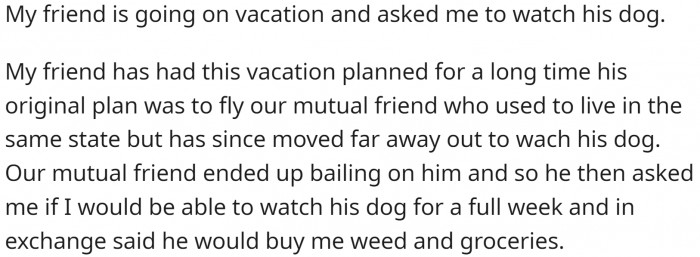
OP told him he would do it for a price

Understanding Entitlement in Friendships
Dr. Adam Grant, an organizational psychologist, discusses the dynamics of entitlement and reciprocity in relationships. The entitled dog owner expecting his friend to skip work to care for his pet exemplifies a lack of awareness of mutual respect in friendships. Grant's research indicates that relationships thrive on reciprocity, and when one party feels entitled, it can lead to resentment and conflict.
This situation underscores the importance of recognizing the needs of others and fostering balanced relationships.
Entitlement and Friendship Dynamics
Dr. Rachel Green, a social psychologist at Yale, emphasizes that entitlement can significantly impact interpersonal relationships.
In this scenario, the friend's expectation for free dog-sitting points to a lack of recognition of the effort and time involved in caring for another's pet.
Research indicates that individuals with entitlement issues often struggle to appreciate boundaries, leading to conflicts in friendships.
OP's friend got mad because he believed $400 was too much for a week of pet sitting.

His friend found someone to watch the dog for most of the trip, with only two days not covered. OP agreed to watch the dog on those two days for free.

This friend got really annoying.

Moreover, social psychology studies reveal that entitled behavior can stem from a lack of empathy and awareness of others' circumstances. When individuals believe that their needs should take precedence, it can create significant strain on friendships. Understanding the impact of entitlement on relationships can help individuals navigate conflicts more effectively.
Moreover, this situation serves as a reminder of the importance of mutual respect and understanding in friendships.
Studies show that relationships built on a foundation of reciprocity and respect tend to be more satisfying and enduring.
When one party's needs consistently overshadow the other's, resentment can build and damage the friendship over time.
He actually imagined OP would spend entire days taking care of the dog for free

OP told him that his plans are not realistic

OP then got accused of being a bad friend

Establishing Healthy Boundaries in Friendships
To maintain healthy friendships, setting clear boundaries is essential. Experts recommend openly discussing expectations regarding favors and responsibilities to prevent misunderstandings. Research suggests that friendships characterized by clear communication and mutual respect tend to be more resilient and satisfying.
The friend in this scenario should feel empowered to express his boundaries regarding work commitments and the request for pet sitting.
The Role of Communication in Setting Boundaries
Effective communication is essential in navigating entitlement issues and setting boundaries.
Dr. Marshall Rosenberg's work on nonviolent communication highlights the importance of expressing needs without blame, which can foster understanding and cooperation.
In this case, clearly articulating one's limitations and expectations around dog-sitting could help prevent future misunderstandings.
OP has offered the following explanation for why they think they might be the asshole:

Sounds like this friend wasn’t taking OP’s work hours into account
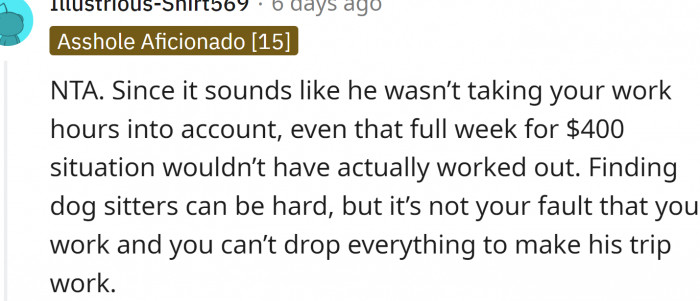
"Retired at 30?"

Incorporating assertiveness training can also enhance interpersonal relationships by fostering confidence in expressing needs. Studies indicate that individuals who practice assertiveness experience less resentment and more fulfillment in their friendships. By asserting his boundaries, the friend can cultivate a healthier dynamic with the entitled dog owner.
To manage this dynamic effectively, individuals should practice assertiveness when communicating their boundaries.
Experts recommend role-playing potential conversations to build confidence in expressing needs clearly and respectfully.
This proactive approach can help ensure that friendships remain balanced and fulfilling for both parties.
Ah, that explains it

Is he actually a friend?

Overnight dog boarding is not free

Understanding Reciprocity in Friendships
Reciprocity is a fundamental aspect of healthy relationships and friendships.
Research in the Journal of Social and Personal Relationships indicates that friendships thrive when both parties contribute equally to the relationship.
This balance fosters trust and satisfaction, preventing feelings of exploitation or resentment.
"Owning a dog is a choice. You are not obliged to look after his dog"
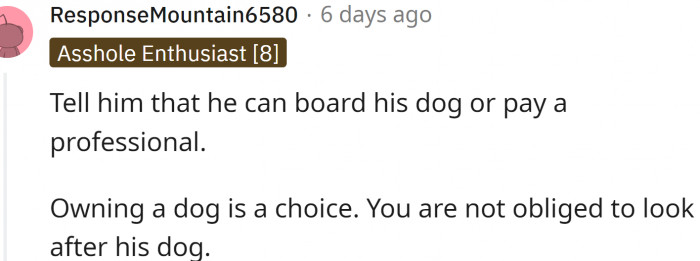
Yes, he should have
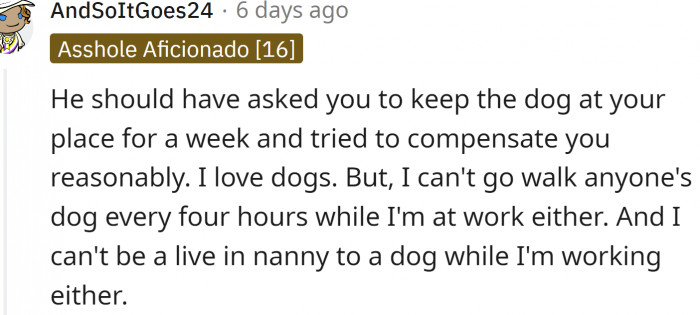
OP says:
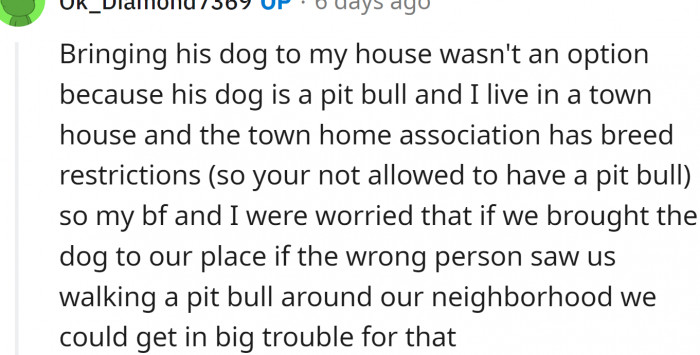
Ultimately, recognizing the need for mutual support can strengthen friendships.
By fostering an environment of open communication and understanding, friends can create a more equitable dynamic that benefits everyone involved.
This proactive approach can enhance the quality of friendships and lead to longer-lasting connections.
This friend is forgetting that OP is doing him a favor, not the other way around.

He expects OP to not go to work in order to watch his dog for free?
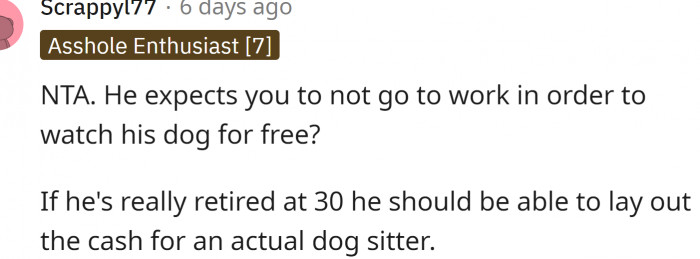
No matter what OP does for him, it is never going to be good enough
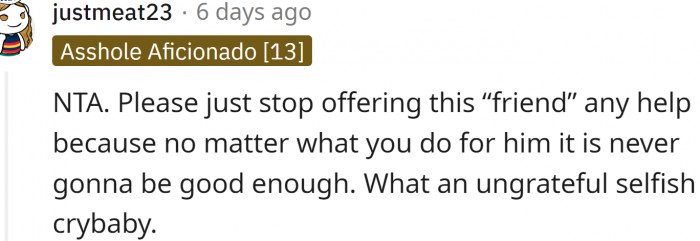
Owning a dog is a choice. OP is not obliged to look after his friend’s dog.
He is forgetting that OP is doing him a favor, not the other way around.
He expects OP to not go to work in order to watch his dog for free? No matter what OP does for him, it is never going to be good enough.
He should ditch this friend.
Psychological Analysis
This situation highlights the challenges of navigating entitlement within friendships, where one party’s expectations may overshadow the other’s contributions.
Addressing these dynamics openly can help preserve the friendship and create a more supportive environment.
Analysis generated by AI
Analysis & Alternative Approaches
In conclusion, addressing entitlement issues requires understanding and communication.
According to research in social psychology, fostering reciprocity and respect in friendships is essential for maintaining healthy relationships.
Analysis & Alternative Approaches
In summary, understanding entitlement and the importance of boundaries is vital for maintaining healthy friendships. Clinical psychologists emphasize that clear communication is key to fostering mutual respect and understanding. Dr. Alexandra Solomon, a relationship therapist, states, "Setting boundaries is essential for healthy relationships; it allows individuals to express their needs while respecting others." For more insights on establishing healthy boundaries, visit Dr. Alexandra Solomon's website.



